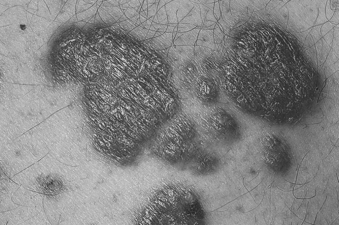76. Sarcoidosis
Definition
Sarcoidosis is a chronic multisystem inflammatory disease characterized by noncaseating granulomas as well as lymphocytic alveolitis.
Incidence
In the United States the overall incidence of sarcoidosis ranges from 5:100,000 to 40:100,000. Among Caucasians the incidence is about 11:100,000, but among African Americans the incidence is about 34:100,000. Internationally the incidence varies with the country as well as the degree of development of the country. For example, in Sweden the incidence is about 20:100,000, whereas in Japan the incidence is about 1.3:100,000. Sarcoidosis has been reported in most countries. In developing countries it is frequently misdiagnosed as tuberculosis. This disease affects men more frequently than women by a 2:1 ratio.
Etiology
The true cause of sarcoidosis is not known. There is evidence of both genetic and environmental causative factors. Sarcoidosis is not a malignant disease, nor is it an autoimmune disease.
Possible Pathogenic Causes of Sarcoidosis
• Chlamydia
• Epstein-Barr virus
• Mycobacteria species
• Mycoplasma species
 |
| Sarcoidosis. Erythematous annular plaques. |
Signs and Symptoms
• Alveolitis
• Anorexia
• Bell’s palsy
• Deafness
• Depressed gag reflex
• Dysphagia
• Elevated monocyte count
• Fatigue
• Hepatomegaly
• Hilar lymphadenopathy
• Hoarseness
• Interstitial nephritis
• Iritis
• Night sweats
• Nonproductive cough
• Peripheral lymphadenopathy
• Shortness of breath
• Skin lesions
• Splenomegaly
• T-cell lymphadenopathy
• Vertigo
• Vocal cord paralysis
• Weight loss
Medical Management
Symptomatic treatment is the only therapeutic measure most patients require. Corticosteroids currently remain the primary course of treatment, but noncorticosteroidal medications are increasingly being used. Methotrexate is often used in place of drugs such as prednisone. Other alternative medications include hydroxychloroquine, cyclosporine, pentoxifylline, and azathioprine. Sarcoidosis that proves refractory to any of these pharmacologic agents may be treated with infliximab and/or thalidomide. Cutaneous manifestations may be treated with tetracycline.
Stay updated, free articles. Join our Telegram channel

Full access? Get Clinical Tree





